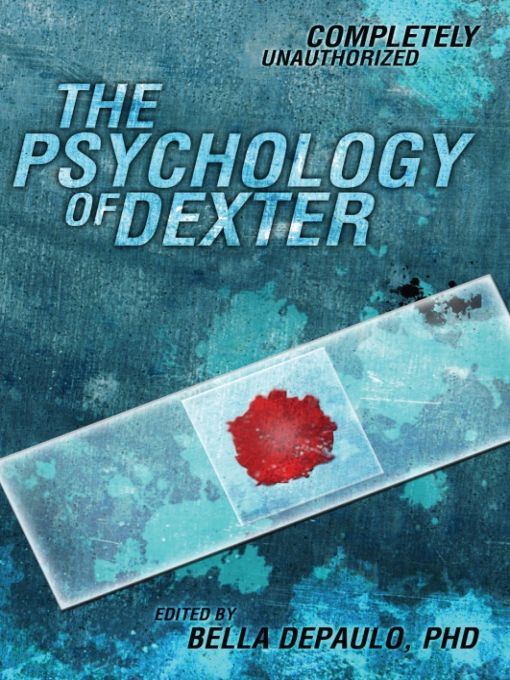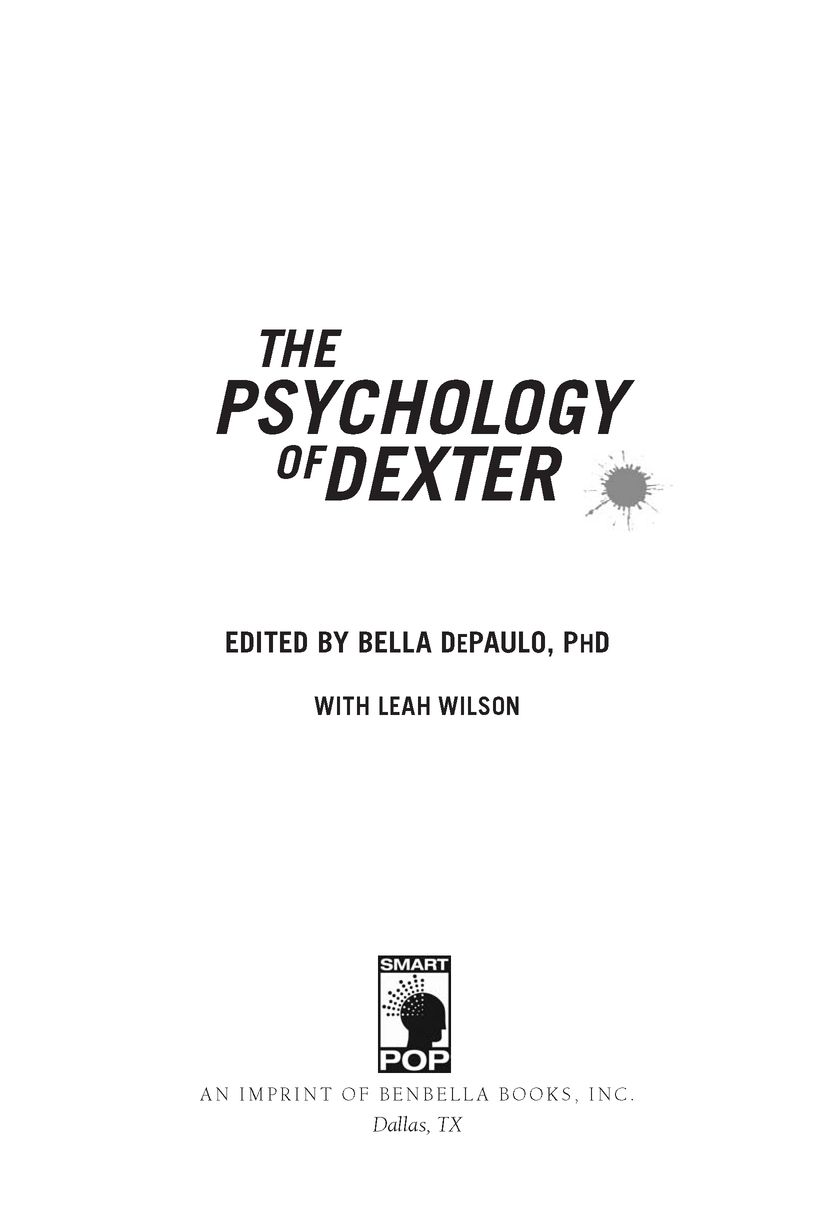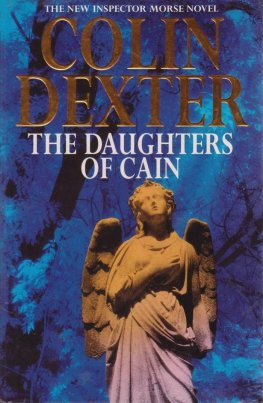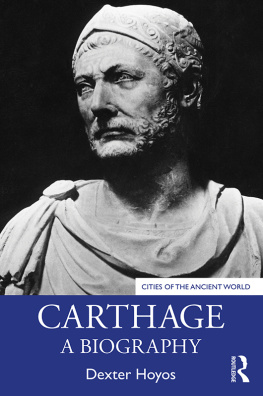Table of Contents
Other Titles in the Psychology of Series
The Psychology of The Simpsons
The Psychology of Survivor
The Psychology of Harry Potter
The Psychology of Superheroes
The Psychology of Joss Whedon
INTRODUCTION:
FOR THE LOVE OF DEXTER
BELLA DEPAULO
Dexter may well be one of the most psychologically delicious treats in television history. We love Dexter. We root for him, season after season.
But hes a killera serial killer! Why do we relish Dexter so much? And why dont we at least feel guilty about our love? Is it because Dex is so unlike us that we dont worry others might misinterpret our interest in him as a sign of our own darkness? Or is the dynamic something much differentthat we all have a wisp of Dexs Dark Passenger within us? As fans who identify with our twisted hero, do we get to let our own demons out to play an hour a week, knowing that its not for real and no one will actually get hurt?
Ive tried to talk about Dexter to all sorts of people. Some I just know will be interested. They are the people who read true crime books and watch other murder-filled movies and TV shows. What stuns me, though, is when I discover, time and again, that Dexter has resonated with people who simply dont fit that mold. What is it about the hero and the show that is so powerful?
Dexter is a feast for the psychologically-minded. Watching him, we realizemaybe in a way we never have beforewhat makes us human. We all feel things. We read other people effortlessly and intuitively. We reach out to fellow humans. We want to connect to them and to nurture those connections. Thats so obviously what we do that we dont need to think about it.
But what if none of that came naturally? Thats one of the most tantalizing questions posed by Dexter. Sure, its fun to think about murderers and psychopaths and what makes them tick. But weve probably all pondered that at times. In your life before Dexter, though, did you ever consider what it would take to pass as an ordinary human if you didnt have the same feelings and needs and desires as everyone around you?
The show is seeded with tiny bursts of surprise and delight, as Dexter fumbles the most ordinary human reactions and mangles routine social interactions. Then were charmed in an entirely different way when Dexter says or does exactly the right thing, even when we know hes just faking it or mimicking someone else.
Season after season, the writers of Dexter address some of the most profound questions about human behavior. For example: What determines who we are and who we become? We are all products of genetic roulette, but no self-respecting scientist believes in genetic determinism. We inherit tendencies, but our environments, including the important people in our lives, shape those inclinations.
Some of the most pessimistic predictions in the writings of psychologists are about psychopaths. For a long time, the prevailing view was that little could be done to set them on a constructive life path. More recently, though, that perspective has been challenged, including by a number of the contributors to this book.
You will find among these chapters the argument that Harry really blew it with Dexter. He thought Dex was doomed to a lifetime of irresistible impulses to killbut he was wrong. He could have guided Dex in an entirely different direction. Maybe Dex is not a full-blown psychopath after all but merely has psychopathic tendencies.
Harry had the opportunity to shepherd his foster son while Dexter was still young. To many psychologists, those early years are the crucial ones, especially for children whose little lives have already been so sodden with trauma. The Dexter we fans see is an adult. Is there still hope for him at this (psychologically) late date? Thats another question addressed in this book.
Dexter has had his angels. Camilla and Rita were there for him in seasons past, and Deb has been there all along. From psychological research and theory we know what these people could do in order to draw Dexter away from his homicidal urges. Eventually we will see if Deb, building on the work that Camilla and Rita have already done, will succeed.
Another fundamental question addressed by the writers of Dexter concerns the nature of evil. Should we think of Dexter as evil because he kills people, or is he redeemed by his choice of victims? There are so many nefarious characters on the show: the criminals Dexter targets; the murderers without a code who are hunted down by the justice-seekers of Miami Metro; the men such as Miguel who tread on one side of the legal line in their public life but descend into atrocity in private; the crazed characters such as Lila; and the despicable ones, like Paul. We can rank order the wickedness of their demonic deeds, cant we?
Maybe. But some of the contributors to this collection will shake your assumptions. Do you think Dexter is way better than Paul? That Paul was abusive but Dex was not? Gong! Maybe youre wrong. Do you think that the certifiable psychopaths are the scariest of criminals? You will find within these pages an argument that it is the most ordinary among us who have the potential to inflict the greatest harm.
Even before I read all of the other chapters in this book, I found myself questioning my initial impressions of Dexter as I wrote my chapter on his deceptions. Dexter, I would begin to say, doesnt worry much about getting caught, the way other humans do. But then Id remember instances in which Dexter did seem apprehensive. Same for his emotions. Id start out thinking he has no real feelings for other people, only to recognize that he did develop what looked like genuine caring for Deb and Camilla and Rita and the kids. Dexter, it turns out, has evolved over the course of the series. Thats not just good televisionthats damned good psychology.
The other contributors concur. One after another noted that the portrayal of Dexter and the people around him is right on targetits psychologically real.
That left me reminding myself that Dexter is a creation. He came out of the mind of Jeff Lindsay, author of Darkly Dreaming Dexter, and the minds of all of the subsequent writers who shaped Dexter into the lovable murderer, colleague, partner, friend, brother, and father that we see on screen. And what a set of minds that is! Together, theyve crafted one of the most psychologically rich heroes on television, and the essays youre about to read will help you appreciate just how complex and well-written Dexter and Dexter really are.
After watching just the first few episodes, I thought I had a pretty good sense of what this Dexter character was all about. Not too interested in sex. Not very emotional. Eerily dispassionate about blood. None of those infamous delusions of grandeur we expect serial killers to have. Hes a killer, sure. But hes a killer with a cause. Dexter snuffs out human lives, but its not for his own satisfaction, sexual or otherwise. Hes making the world a safer place. Hes doing it for us. I dont usually like to be wrong, but reading Jared DeFifes essay and having my initial assumptions pulled apart, limb by limb, was a delight.
PREDATOR ON THE PROWL
JARED A. DEFIFE










